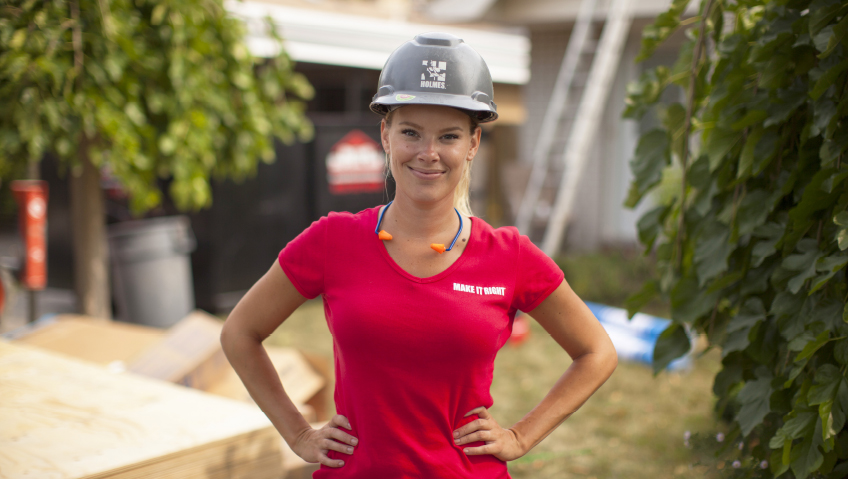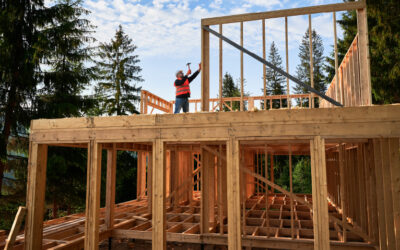Sherry Holmes knows exactly why women are essential in the construction industry. She has long-term, firsthand experience growing up in Canada’s renowned Holmes family, first working behind-the-scenes on her father Mike’s series, Holmes on Homes, followed by becoming proficient with power tools in her own right on Holmes Inspection, Holmes Makes It Right, DIY Network’s Holmes: Next Generation, and most recently Holmes Family Rescue airing on HGTV US and CTV Life. Her passion and dedication are something she’s now determined to share with a generation of girls who may not even know this career path exists.
“I think women are amazing for construction — and any skilled trades — because we do bring a fresh and different perspective, especially on a job site,” Holmes says. “I think women are so amazing because we strive to do well. We want to prove we can do it, so we’re hard-working and we want to show the world who’s boss.”
So, while women can do it and are amazing at it, what’s holding them back? In a largely male-dominated industry, the intimidation factor can be daunting, and one of the issues that prevents women from even considering entering this work space.
“To become involved in construction or choose that path to follow is kind of scary,” says Holmes. “I was terrified when I started. I was embarrassed to learn something new. I didn’t want all the men to turn around and say, ‘What is she doing here, she doesn’t know what she’s doing.’ It’s very nerve-racking. I think that’s one of our biggest issues and what keeps us out of the trades.”
Holmes understands this challenge firsthand, having felt those feelings when she first joined Mike’s Make It Right crew at just 21 years old.
“Math isn’t my best skill; I had no idea how to read a measuring tape and I was so embarrassed to learn,” she shares. “My brother actually taught me. We were hiding behind the corner of a house we were building because I didn’t want everyone to think I wasn’t good enough to make this work.”
Despite a bumpy start, Holmes persevered and has seen a lot of women become more involved in the trades now that doors are starting to open. Many are realizing that the construction field is not only a great career opportunity financially; it also brings numerous personal rewards.
“It’s a really lucrative career,” she says, “but it’s also satisfying because you’re doing your own work. It’s rewarding to stand back and say, ‘look what I did, look what I built, look what I made with my hands.’”
The jobs are out there, she adds, and there are different ways to get there, whether through college, university, or job site experience. The question is, where does the shift come to encourage more girls to consider trades as a possible career option?
“I think the training starts with parents,” says Holmes. “We have to realize that it’s a viable career option for women and hard work and manual labour isn’t just for men. [We also need to challenge the notion that] if you’re not very book smart, you should go into the trades. All of that’s ridiculous and I think it’s really just a stigma of the skilled trades.”
Along with a supportive home front, girls also need encouragement at school, whether through counsellors, programs, or teachers: whoever you can look up to, open up to, and ask these kinds of questions of, Holmes says.
“I wasn’t taught a lot of that in school; I didn’t get to do carpentry in middle school. The girls had to take a semester of home economics. I had to make nylon babies, I had to learn how to run a household, but no one taught me how to fix my house should anything happen.”
To that end, Holmes is a strong proponent of Skills Canada, a program that enables women and youth in general to be exposed to an umbrella of skilled trades including carpentry, masonry, hairstyling, pottery, framing, baking and cooking.
“Skills Canada helps get you started,” she says. “They run a program called Try-A-Trade that brings youth in and lets them try all kinds of different trades. It’s really amazing. I didn’t get a chance to try welding when I was in school to see if I’d be good at it; I didn’t try plumbing. If you’ve never held a drill or used a mitre saw or skill saw, you can do that there. They let you try it out to see how you feel so it’s not as scary or intimidating when you’re in adulthood and have never seen these tools before.”
Support and encouragement for youth goes a long way, but the challenges don’t automatically end once you’ve made it in the industry, Holmes adds. The lack of appropriate PPE and work attire is one unexpected obstacle.
“I still have a hard time finding construction boots and steel toe boots that fit my feet,” she says. “I have a smaller foot size and I have to reach out to brands to see if they have those availabilities. I’ve had people send me boots because you can’t find them in stores anywhere.”
Safety harnesses, required for working at heights, present another issue, as nothing would fit her when she started out.
“I would actually fall out of a harness, it was so big,” she says. “They had to custom fit me as a typical harness isn’t going to fit women the same way it fits a man. We need to have these things available because we have different bodies.”
Even gloves are a challenge, as most are too big for her. “I like having the grip and being able to feel things with my hands; however, should you need a pair of gloves, it’s actually unsafe for me to wear them if they don’t fit me properly. I won’t have a grip on tools, so I could slip up and drop something, which is terribly dangerous.”
And items don’t need to be pink, another common theme in the women’s clothing industry. “I don’t want to wear pink! I’m not in the construction industry just to stand out,” she says. “It’s okay if you’d like to, but I don’t want to have that huge barrier. Women and men can all do the same thing so why do I want to say, ‘look at me, I’m a girl.’ I want to say, ‘look at me, I’m doing the exact same thing you’re doing.’”
Over the years, Sherry Holmes has had the opportunity to do some truly amazing work, including her very first job at the age of 21 in New Orleans after Hurricane Katrina.
“We built a house on stilts. That was my very first project. It was amazing and an experience I’ll never forget,” she says. “New Orleans definitely holds a special place in my heart.”
She’s grateful for the many opportunities she’s had to help people, including rebuilding a castle park in High Park, Toronto. “It was probably one of the coolest things I’ve ever done and it’s where I met my husband,” she says. “How many people can say they built a castle?”
Even while pregnant, Holmes remained working on site, albeit with more attention to heavy lifting or precarious situations. “We’re still capable of doing all these things. Just because you’re pregnant doesn’t mean you have to sit on the couch and be alone for nine months,” she says. “There are obviously things you have to take into consideration to be safe. I’m big on listening to my body, so I’m not going to do something if it hurts.”
As her pregnancy progressed and there were more things she couldn’t do, she credits her co-workers with helping ensure she wasn’t putting undue strain on herself.
“You work with wonderful people and you have a lot of help when there are things you can’t do as you get more tired,” she says. “You can’t do everything, and as women we feel like we have to do everything. It’s important to realize you can’t.”
Now mom to two daughters, Holmes would be thrilled for them to enter the family business one day, but she plans to be supportive of any career path they follow.
“When I had my first girl, I went back to work two months post-partum and I brought her with me, so she’s always been around a job site, and my baby has been on site with me several times already,” she shares. “Whatever they want to do, I support. I want to introduce them to every career path possible because you never know what they’re going to excel at, so why not introduce them at a younger age. If they don’t want to be in the trades, I’m not going to be upset. If it’s something they’d like to pursue, absolutely I’m behind them.”
Education is key, she adds, but the type of education that works for each individual will differ, whether that’s a hands-on program like Skills Canada, or university or college courses.
“University isn’t going to work for everyone,” she says. “Individuals are different, so don’t be discouraged and keep going. I did well in school so I was told I had to go to university and college was selling myself short. That’s such a bad thing to be selling to kids these days. Do you know how hard it is to work in the trades? There are things I’ve had to try to figure out that I’m not great at, but you keep challenging yourself and keep learning because you can’t be perfect and we’re not all great at everything.”
Her advice to girls and women is simple: Try everything, because everything is possible.
“Educate yourself. Read a book about something you think you could be interested in. If you have a family member who’s involved in skilled trades, shadow them for a day, or ask them all the questions you need,” she says. “It’s so empowering and satisfying to know you don’t need a man or anyone else in your life to take care of you. You’re capable of doing it all yourself!”
She also suggests trying different tools — under supervision, of course, to be safe. Thinking outside the box is also essential, as “traditional” careers won’t necessarily work for everyone.
“We all change our minds. I still add different things to my skill set because I want to continue learning,” she says. “Continue to educate yourself, continue to look and find people to talk to. You need that support system or you’re never going to try new things and you’re never going to learn.”













